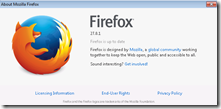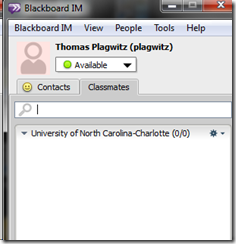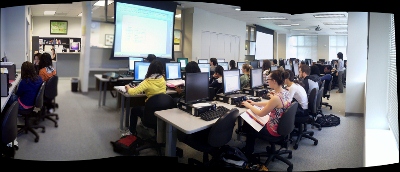Archive
Archive for the ‘textbooks’ Category
Sample learner speech recognition speaking practice task assignments and screencast completions
2014/09/14
Leave a comment
- My initial test of W7ASR mV8MRY used an end-of-chapter web quest from a 1st-year German textbook. From reading for the gist to pronouncing an authentic target culture text is a challenge – make it extra credit.
- Turn existing writing exercises into speaking/ reading/ corrective writing exercises: Free form writing during note taking, e.g. when answering comprehension or short essay questions, fits the continuous speech optimization of W7ASR.
- You will likely see reduced recognition accuracy and less proofing feedback, but gain wider applicability for (grammar, but especially vocabulary) drills that use discrete writing, e.g. filling in cloze exercises (navigation need not be done by voice), even in a web browser from your LMS or online textbook.
- Turn “flipped classroom” homework preparation fill-in-the-blank conversation suggestions into more hands-on phrase dictations before your in-class communicative practice.
- Similarly, my Spanish screencasts, e.g. qK9fKV, flips our Spanish for Law Enforcement: If W7ASR can ”understand” your Miranda warning, a suspect likely can also.
- Finally, the most advanced language learners can replace writing of essay tasks from their textbooks by speaking them – use of only ASR for editing is optional.
- All above tasks are based on existing textbook and/or syllabus which are easily extended by Windows 7 “open response” speech recognition.
Categories: conferences, e-languages, Speaking, textbooks
speech-recognition
Firefox Java AddOn settings on learning lab PCs
2014/02/17
Leave a comment
- FireFox should not be allowed to update automatically:
- Java within Firefox
- should not be allowed to update automatically

- especially not for Java (7.51 breaks our online textbook components)
- but it has not updated to 7.51
- is this b/o the Deployment Toolkit also being deactivated? Not sure: “By blocking the Java DT plug-in, the Java version detection mechanism is disabled. Therefore, when a user tries to launch a Java applet or application, that requires a specific Java version other than the active Java version on a user’s system, it will fail.”

- should not be set to “ask” every time (on frozen computers), plus: users miss the notification that asks them to enable it
- should not be allowed to update automatically
Categories: e-infrastructure, textbooks
image2014spring, java, mozilla-firefox
Run mmsys.cpl if you get no audible output in a Blackboard IM call on your PC
2014/02/05
Leave a comment
- Problem: Blackboard IM (4.5.3), in its call window , gives you audio output volume meters
 , but no actual audio output.
, but no actual audio output. - Reason: Blackboard IM seems to have its on in-built idea which device to output audio to, even if you have no actual speakers plugged in to hear, and it is rather difficult to dissuade.
- Solution:
- Start / Run /”mmsys.cpl”, “OK”: Do the volume meters in there indicate that Blackboard IM outputs to another but your expected speaker (even if the other device is not the default)?


- Right-click on the other speaker device and Disable it.
- Also make sure to restart Blackboard IM. The built-in startup / dial tones will tell you immediately whether audio output works now
Categories: e-infrastructure, textbooks, web-conferencing
audio, blackboard, enfoques, im, java, vistahigherlearning, wimba-pronto
How to test Voice boards (Blackboard Collaborate, formerly Wimba voice) for Vista Higher Learning (Supersite3) Textbooks
2014/02/04
1 comment
- First I create a voice board,



- and add an audio contribution so that students can respond:

- Fail:



- More fail


- The help offered is of no use: “If the Applet displayed the message “Audio Unavailable”, click here. “ This is neither the error message, nor does the help address Java (but rather audio hardware config) issues
- But if you refresh (F5 suffices) the window with the Setup Wizard, it starts working?

- Even the audio recorder:

- And the voice board (after F5):



- What Java version is this under ?
- Now a user needs to test from the student view
How to test Blackboard IM (formerly Wimba Pronto) for Vista Higher Learning Textbooks
2014/02/04
Leave a comment
Categories: e-infrastructure, Student-Computers, textbooks, web-conferencing
audio, blackboard, enfoques, im, image2014spring, java, pronto, supersite, vistahigherlearning, wimba
Free interactive online learning materials for Heinle Interaction
2014/01/30
Leave a comment
- Available here – in spite of the prominent user login button, you do not need to sign up.
- Rather simply click the “Select Chapter” to get started.

- You then have access to some of these types of exercises, per chapter:

- Free (a (free) account is not needed):
- Tutorial Quiz
- Audio
- Web Search Activities
- Concentration
- Heinle Playlist
- Google Earth Coordinates
- Web Links
- Not free
- What this content is good for:
- Practicing. Including with a tutor, for since this content is not assessed, there is no ethical issue if the tutor helps with these materials.
- It is from edition 8, which is not the current edition – but I expect it to be still reasonably to the current chapters chapter:
- Le commerce et la consommation
- Modes de vie
- La vie des jeunes
- Les télécommunications
- La presse et le message
- Le mot et l’image
- Les transports et la technologie
- A la fac
- La francophonie
- Découvrir et se décourvir
Firefox and Chrome – Enterprise version in computer lab image?
2013/12/19
Leave a comment
- The tension between having to update the platform while not leaving the ecosystem behind seems one of the oldest issues IT – does the web browser platform add something fundamentally new to the mix?
- My understanding has always been that campus computer labs should run the “enterprise versions” of the Chrome and Firefox web browser, especially if they advertise the non-default web browsers to students on the start menu right next to Internet Explorer (which IT, with the help of the Windows Update tools that allow to shut out forced Internet Explorer’s upgrade, upgrades very conservatively, in order to not break applications).
- Reason for installing enterprise versions in the (ahem!) enterprise is that – I believe to know this for Firefox ESR – the enterprise version:
- is kept up to date with security patches, but
- is feature-stable (as opposed to the consumer version which gets updated every few weeks) which allows our software vendors – textbook websites etc. – to make sure their software works on a mainstream, non-cutting edge version of the web browser. Case in point which would likely cause havoc when trying to use online language textbooks in the LRC over the next term: http://www.theregister.co.uk/2013/12/10/firefox_26_blocks_java/
- Running the enterprise version of the software should also relieve
- IT departments of constant updates and testing, and
- students using deep-frozen lab computers to – every time they log in on a computer – having to wait for the auto update of the web browser to go through.
- E.g. you can see from this Firefox ESR version history graphic, that it has been on version 17 since November 2012, and that version 17, after an overlap of a few weeks, is now (December 3) deprecated, in favor of version 24.
- That means: with Firefox ESR, we were spared from having to deal with (test application software compatibility, like online textbooks) the 7 individual upgrades in between. If we upgrade to ESR version 24 now, we will likely for another full year receive security patches, but not have to deal with features that break instructional websites.
- Given this, I assume we should upgrade to Firefox ESR (and the Chrome equivalent, if it is one, i.e. works like Firefox ESR) in the LRC image
How to work around “Audio init failed” when recording in MyLanguageLab
2013/11/12
Leave a comment
- If you see this (or similar errors):

- Try running the browser tune-up,

- check for any new software versions (you can update Java, unfortunately only for your current session on this computer)
- finally run the voice recording setup wizard to check for results.

- Suggest you do this before entering a homework assignment, since a timer may be keeping running while you troubleshoot




















